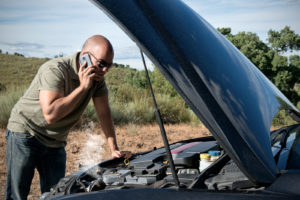What to Do When Your Car’s Engine Overheats
June 18th, 2020 by Fix Auto USA

Your car’s engine usually performs great. But, if your engine starts to overheat, you need to know what to do to prevent long-lasting damage.
What Causes an Engine to Overheat?
A typical car engine operates at temperatures that range from 195°F to 220°F. When it does so, the engine maintains proper emissions control, along with reliable performance and good fuel economy. Yet, an engine’s cooling system can sometimes malfunction, which can cause the engine to overheat.
Your car engine’s cooling system features a coolant that consists of a 50/50 mix of water and ethylene glycol antifreeze. The system’s coolant typically boils at 225°F, unless it remains under the pressure of a radiator cap.
A 15 PSI radiator cap ups the boiling temperature of the coolant to about 265°F. If the coolant mixture consists of 70% antifreeze and 30% water, i.e. the maximum recommended level, its boiling temperature can rise to 276°F with a 15 PSI radiator cap in place.
However, if your engine’s cooling system cannot properly absorb, transport, and dissipate heat, the engine can overheat. Any of these problems can occur for a number of reasons, such as:
- Low coolant level
- Coolant leak
- Poor heat conductivity
- Defective thermostat
- Poor airflow from the radiator
- Malfunctioning electric cooling fan
- Defective radiator cap
You need to address an overheating engine as quickly as possible. To do so, you must first be able to identify the warning signs of an engine that is overheating.
What Happens When a Car Engine Overheats?
Common warning signs of a car engine that overheats include:
1. Hot Hood
A running car engine heats the hood, and you can safely touch the hood to feel its warmth. If your car’s engine overheats, the hood becomes extremely hot, to the point where it is unsafe to keep your hand on the hood for more than a few seconds due to the risk of burns.
2. Dashboard Temperature Light
Your car’s dashboard has a temperature light that flashes when your vehicle’s engine is generating excessive amounts of heat. This light is helpful in identifying an overheating engine, but it is not foolproof. Since the light is activated based on the temperature of the coolant in your engine’s cooling system, it may not be able to tell if your car’s engine is overheating due to a coolant leak.
3. Ticking
A ticking sound is something no car owner wants to hear coming from the engine. This sound usually indicates that your car’s engine oil is not properly lubricating various engine components. If your vehicle is running at high temperatures, the ticking sound is a telltale sign that your engine parts are clacking against one another loudly, which results in substantial wear and tear.
4. Coolant on the Ground
A puddle of coolant underneath your car is a sign that your vehicle is leaking coolant. It may also show that your car’s engine is overheating, which has caused coolant to boil within the radiator.
5. Steam from the Hood
Steam coming out from underneath your car’s hood indicates that your vehicle’s coolant has reached its boiling point. At this time, the coolant converts from liquid to steam, and steam will billow out from the front and sides of the hood.
What to Do When the Engine Overheats
If your engine overheats, you should:
1. Turn Off the A/C and Turn Up the Heat
Deactivate your car’s A/C to minimize stress on the engine. Next, activate the heat and set it at the maximum level. This allows you to pull heat away from your engine.
2. Pull Over to the Side of the Road
If you’re driving and your car’s engine starts to overheat, pull over to the side of the road as soon as you can. Take the key out of the ignition, and let your car cool off for at least 15 minutes.
Keep an eye on your car’s temperature gauge. If the temperature gauge moves back to a normal level, it means your car has officially cooled down.
3. Check the Coolant
If possible, check the coolant level in your car engine’s cooling system and top it off if the coolant is low. If you’re unsure about where your car’s coolant reservoir tank is located, consult your owner’s manual.
4. Restart the Engine
If your car’s temperature has reached a normal level, restart your vehicle. But, if your car’s temperature starts to rise once again when you’re driving, pull over to the side of the road, and contact a tow company to have your vehicle towed home or to an auto body repair shop.
How to Prevent Your Car Engine from Overheating
Regular car maintenance is the best way to prevent your car engine from overheating. If you receive coolant flushes, radiator maintenance, and other periodic car repairs, you can lower the risk that your engine will overheat.
To determine how long to wait for regular car maintenance, review your owner’s manual. Or, when in doubt, visit an auto body repair shop, as this allows you to set up a schedule with auto experts for all types of car maintenance.
Lastly, if you notice your car’s engine is overheating or you are concerned that your vehicle’s engine may start to overheat, get assistance right away. By addressing car engine issues, you can keep your vehicle running at peak levels and avoid costly, time-intensive repairs down the line.
This blog post was contributed by Fix Auto Monterey a leading industry expert and collision repair shop servicing the greater Monterey Bay region, including Carmel, Pebble Beach, Del Monte, Seaside, Sand City, Pacific Grove, and Del Rey Oaks.
Welcome to
Fix Auto USA
We are the premier independent body shop network delivering world-class customer service and high-quality collision repairs across the U.S.
Learn About Us





